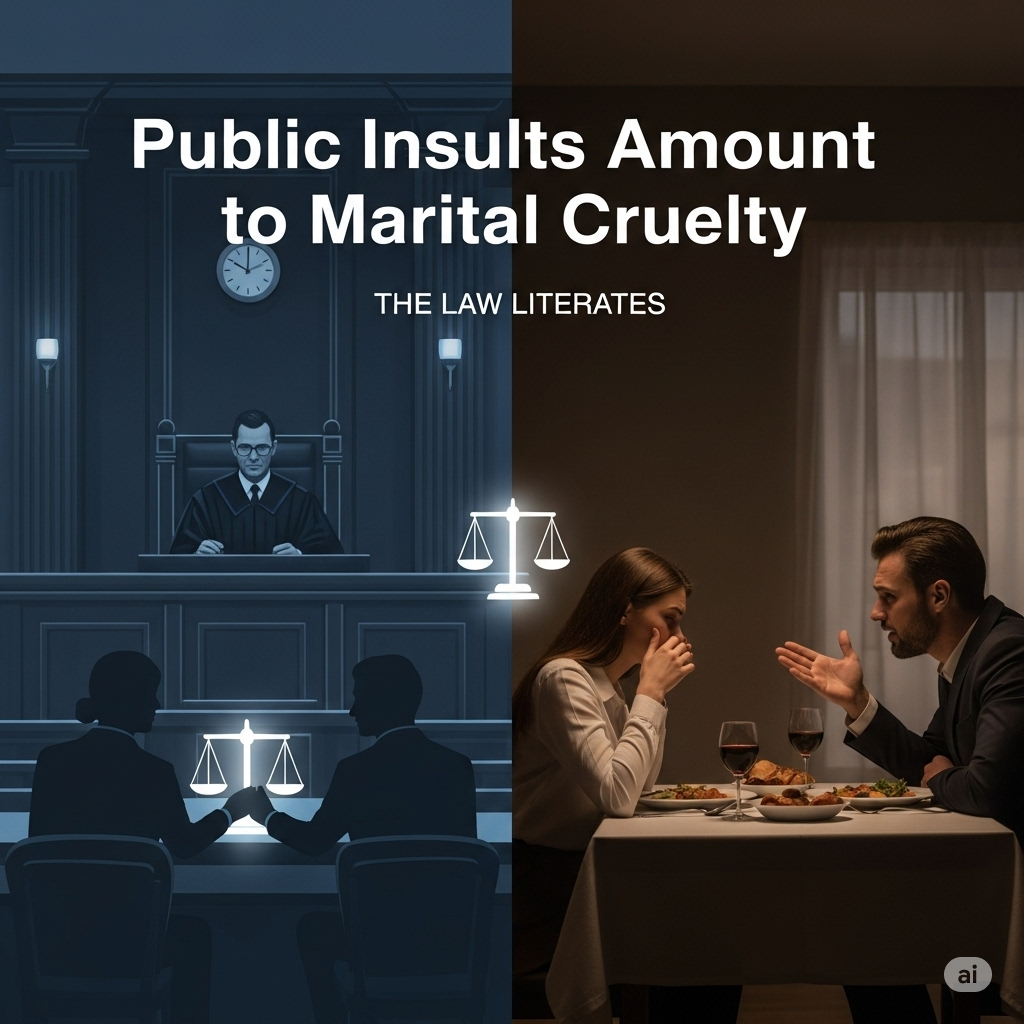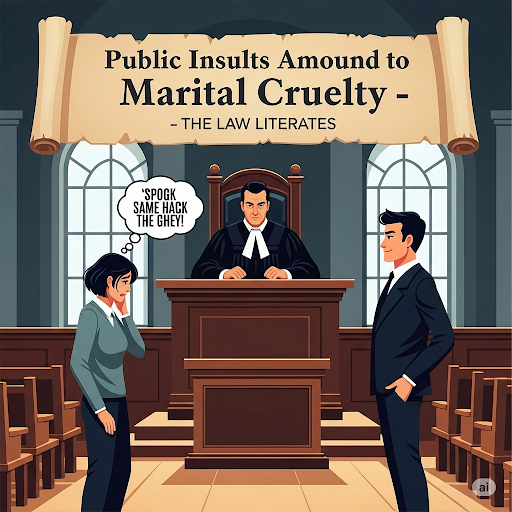Court’s View on Insults by Spouse and Mental Cruelty – When Accusations Cross the Line: the Law Literates
We often hear about cruelty in relationships, but it’s not always about physical harm. Emotional and psychological distress can be just as damaging, if not more so, especially when it comes to marital harmony. A recent observation by the Hon’ble Bombay High Court shed light on a crucial aspect of this, i.e how a wife’s public accusations of an extra-marital affair, coupled with insults in front of friends, can indeed constitute mental cruelty against her husband. This isn’t just about hurt feelings but it’s about a profound impact on one’s self-respect and mental peace.
How Public Humiliation leaves invisible Scars
Imagine this scenario: you’re with your friends, enjoying a casual evening, when suddenly your spouse launches into a tirade, accusing you of infidelity and hurling insults. This isn’t happening behind closed doors; it’s in a public setting, witnessed by people you respect and trust. The immediate aftermath is a cocktail of shock, embarrassment, and profound hurt. But the damage doesn’t stop there.
Such an incident doesn’t just pass with the moment. It stays, affecting your sense of self-worth. The court rightly recognized that these kinds of accusations, especially when made publicly and laced with insults, strike at the very core of a person’s dignity. For a husband, being publicly shamed and accused of such a deeply personal betrayal can shatter his reputation among his peers and, more importantly, within himself.
From a legal standpoint in India, “cruelty” as a ground for divorce is primarily covered under Section 13(1)(ia) of the Hindu Marriage Act, 1955. This section allows either the husband or the wife to seek a divorce if the other party has treated them with cruelty. While the Act doesn’t define “cruelty” explicitly, judicial interpretations have broadened its scope to include mental cruelty.
It’s important to distinguish between a heated argument and an act of mental cruelty. Disagreements are a part of any relationship. However, when accusations are baseless, hurled with the intent to demean, and delivered in a manner designed to inflict maximum public humiliation, they cross a significant line.
The court’s observation underscores that the intent and impact are key. If a wife repeatedly or significantly makes such accusations, knowing they are false or without sufficient proof, and deliberately chooses a public forum to inflict pain, it points towards a clear pattern of cruel behavior. The “cruelty” here lies in the deliberate attempt to cause severe emotional distress and tarnish the husband’s image.
Landmark Judgments given by the Hon’ble Supreme Court and various Hon’ble High Courts of India have consistently held that false, defamatory, and unsubstantiated allegations, particularly those concerning infidelity, made against a spouse can constitute mental cruelty. The legal principle is that such conduct causes immense mental agony, making it impossible for the aggrieved spouse to continue the matrimonial relationship.
Why Does Self-Respect Matter So Much in Marriage? And What Courts Say
Self-respect isn’t just an individual trait but it’s a foundational pillar of any healthy relationship. When one partner systematically erodes the other’s self-respect, it creates an environment of fear, anxiety, and resentment. In the context of marriage, trust and respect are paramount. When one partner is constantly subjected to public humiliation and false accusations, it becomes impossible to maintain a harmonious and supportive environment.
The court’s focus on the impact on the husband’s mental peace is also critical. Living under a constant cloud of suspicion, with the threat of public denigration, can lead to significant psychological distress, including anxiety, depression, and a complete breakdown of marital intimacy.
Several Supreme Court judgments have elucidated on the concept of mental cruelty. In the case of Samar Ghosh v. Jaya Ghosh (2007), the Supreme Court provided an illustrative list of acts that could amount to mental cruelty, emphasizing that it must be of such a nature that the parties cannot reasonably be expected to live together. While this case did not directly deal with public accusation of infidelity by the wife against the husband, it laid down the broad principles for what constitutes mental cruelty.
In the landmark case of K. Srinivas Rao v. D.A. Deepa (2013), the Supreme Court held that false allegations of mental illness or immoral conduct leveled by one spouse against the other could amount to mental cruelty. This principle can be extended to false public accusations of an extra-marital affair, which inherently involve allegations of immoral conduct and can cause profound mental anguish.
The Hon’ble Delhi High Court in Saurabh Jain v. Neha Jain (2024 SCC Del 1971), explicitly stated that “to be openly humiliated and being called as impotent by respondent-wife, in front of others and for respondent to discuss their sexual life in the presence of family members, could only be termed as an act of humiliation causing mental cruelty to appellant.”
While different in specific facts, the underlying principle of public humiliation leading to mental cruelty is clear. Similarly, in Vishwanath Sitaram Agrawal v. Sarla Vishwanath Agrawal (AIR 2012 SC 2586), the Hon’ble Supreme Court observed that the publication of a notice by the wife through her advocate stating the husband was a womanizer amounted to mental cruelty, causing humiliation and a dent in his reputation.
These judgments collectively highlight that the conduct must be of such a nature as to cause mental pain, agony, or suffering, making it impossible for the aggrieved spouse to live with the other.
These observations by the Courts serves as a crucial reminder that emotional abuse is as serious as physical abuse in the eyes of the law, especially when it comes to grounds for divorce or separation. It reinforces the idea that cruelty isn’t limited to visible injuries; the invisible wounds of psychological torment can be equally, if not more, devastating.
Ultimately, a marriage should be a safe haven of mutual respect and understanding. When that trust is shattered by public accusations and insults, the very foundation of the relationship crumbles, and the law recognizes the profound harm inflicted.
Wriiten By Ranvir Singh (VIPS, IP University Delhi)
All rights Reserved (Adv Vaibhav Tomar)



